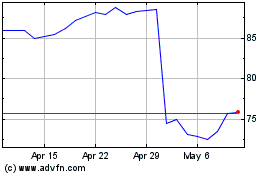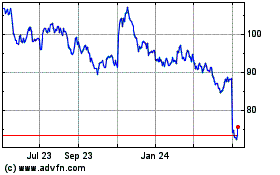By Saabira Chaudhuri
The war on plastics is being put on hold as the battle to
contain coronavirus ramps up.
Single-use plastic products, in the crosshairs over
environmental concerns in recent years, are now getting a boost
amid efforts to stop the spread of the virus. Personal drinking
cups and reusable shopping bags are being shunned, while sales of
bottled water, masks and wipes -- made from plastic -- have soared.
At the same time, some recycling programs are being suspended
because of concerns about the virus spreading.
Starbucks Corp. has said stores that remain open in North
America would serve coffee only in disposable cups for takeout.
Starbucks, Dunkin' Brands Group Inc. and Tim Hortons -- owned by
Restaurant Brands International Inc. -- have all stopped filling
customers' reusable cups, a U-turn after years of encouraging
them.
Fearing reusable shopping bags could spread the virus, New York
state Sen. John Flanagan is calling for the state's plastic-bag ban
to be suspended. Nick Isgro, mayor of Waterville, Maine, is seeking
a ban on reusable bags for 60 days.
"Whether it's coronavirus that gets transferred or something
else, we know scientifically these things are laden with germs
because a lot of people just don't clean them," Mr. Isgro said.
Environmentalists say temporary moves away from reusable cups
and bags could have a lasting impact on the fight against
single-use plastics. They worry the moves could raise bigger doubts
about the hygiene of reusable products and disrupt fragile consumer
habits.
Larissa Copello de Souza, a campaigner at Zero Waste Europe, a
Brussels-based nonprofit, said companies were shortsighted to focus
only on the threat posed by coronavirus. "We cannot forget and
disregard the other big current challenges we are also currently
facing," she said, citing climate change, waste and plastic
production. "Promoting the use of reusables is certainly one of the
greatest practices we can have to address those issues."
Upstream, a nonprofit, also defended reusables.
"Coronavirus mainly spreads through coughs and sneezes, not your
reusable water bottle or cup," it said, adding that disposable
items could harbor pathogens that settled during manufacturing and
transportation.
However, it also noted that the virus had shown that better
systems were needed for reusables, like hands-free dispensers in
stores and on-site sanitizing for personal containers.
Health experts have conflicting opinions on whether banning
reusable cups and bags would help curb the virus.
"It's drawing a pretty long bow to believe this will be
meaningfully impactful," said Cameron Wolfe, associate professor of
medicine in the division of infectious diseases at Duke University.
"It's an incredibly low likelihood that the cup would be the
primary vehicle for transmission to occur."
Coronavirus can survive for a period outside the body and is
transmitted through droplets like those generated by a cough or a
sneeze. If a cup is infected, its owner probably is too, said Mr.
Wolfe, making handing over cash and touching door handles
potentially just as risky.
"You'd have a better impact if you told customers with active
coughs not to come in, or to use hand sanitizer before approaching
the coffee stand, " he said.
Others, though, say retailers are right to take every possible
precaution.
"When something is as transmissible as this you want to minimize
all possibilities," said Jonathan Abraham, an assistant professor
of microbiology at Harvard Medical School. "It's better to be extra
careful than assume it's overkill."
Brian Black, a regular Dunkin' customer in Asheville N.C., was
surprised when his local outlet wouldn't refill his reusable cup
last week. Still, the 46-year-old, who works in building
automation, appreciated the change since he said Dunkin' uses the
same spoon to stir multiple coffees and other people's reusable
cups may not be germ-free. Dunkin' didn't respond to a request for
comment.
While coffee chains have embraced reusable, personal cups as a
simple and effective way to cut waste and reduce their carbon
footprints, only a few customers habitually bring these in.
Starbucks in 2008 said 25% of its cups would be reusable by
2015. Today in the U.S., roughly 1.8% of Starbucks beverages are
served in reusable cups, despite the company offering a discount
for personal cups. In the U.K., where Starbucks charges a small fee
for paper cups in addition to offering a discount for reusable
ones, the figure is about 5.8%.
Ravi Dhar, director of the Center for Customer Insights at the
Yale School of Management, says habit formation is particularly
important when trying to persuade people to change their behavior.
Once habits are set, people behave without careful deliberation,
like automatically brushing one's teeth every morning.
"If a new habit is created around using disposable cups, it is
likely that returning to reusable will be harder," he said. "This
is especially if this new practice lasts for a few months and for
high-frequency behavior -- like buying coffee."
Starbucks says it is still giving people who bring in their own
cups the discount, they just can't use them.
Katherine White, a professor of consumer insights at the
University of Calgary, recently had a reusable cup declined at a
Starbucks. She says the move "seems counterproductive to
sustainable habit formation and the goals of companies" and that it
"gives people a potential excuse for not bringing a reusable mug in
the future."
Write to Saabira Chaudhuri at saabira.chaudhuri@wsj.com
(END) Dow Jones Newswires
March 19, 2020 09:37 ET (13:37 GMT)
Copyright (c) 2020 Dow Jones & Company, Inc.
Starbucks (NASDAQ:SBUX)
Historical Stock Chart
From Mar 2024 to Apr 2024

Starbucks (NASDAQ:SBUX)
Historical Stock Chart
From Apr 2023 to Apr 2024
